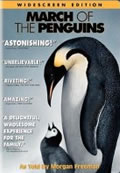| |
MOVIE REVIEW FOR ...
March of the Penguins
Documentary; Narrated by: Morgan Freeman; Released: 2005
 March of the Penguins opens with stunning distance shots of seemingly impossible icescape formations in the Antarctic wilderness. No creature could live in such a beautiful but utterly barren place. Or so one would think.
March of the Penguins opens with stunning distance shots of seemingly impossible icescape formations in the Antarctic wilderness. No creature could live in such a beautiful but utterly barren place. Or so one would think.
Emperor penguins do live here, along with some other hardy species. Though they spend most of their time in and near the water, once a year the members of this penguin species troop 70 miles over the ice to their frozen inland breeding area. They spend months there in the process of courtship and breeding, egg tending, and chick rearing, mostly without food, braving wind and sub-zero temperatures all the while—an insane logistical plan for ensuring the continuation of their species.
Insane or not, it does work, and the penguin chicks finally make their appearance. In March of the Penguins, viewers will find the requisite number of "cute shots" of fluffy chicks and youngsters doing the adorable things that the young of any species do. Not all of the new penguin chicks survive, of course—cold, hunger, and predators all take their toll. Older adult penguins also sometimes fall to the unrelenting cold and the stress of going so long without food. Back at the feeding grounds, predators like leopard seals can take down even the 4-foot-tall adults. The film does not overplay such life-and-death realities, but shows enough of them to remind us that no matter how elegant and fascinating nature is, its fundamental laws are harsh.
|
Emperor penguins' stature and shape, combined with their tuxedoed appearance and overweight waddling, somehow make them seem slightly human. The courtship of Emperor penguins is elegant and tender, never violent or vulgar. At times a paired male and female even seem to be competing to see which one can look more regal and worthy of the species' name.
|
|
NO STUNT DOUBLES HERE! |
|
As amazing as the initial landscape shots are, some of the underwater shots are equally breathtaking, with penguins swimming acrobatically through the shadowy waters, leaving us amazed that the shots are not just clips djinned up in a Hollywood special-effects studio.
|
|
Throughout the film, viewers will find themselves emitting "ah's!" of surprise and fascination, nods of appreciation, and occasional laughter at the penguins' antics. The filmmakers here deserve much credit, not only for their skill at combining the footage and Morgan Freeman's narration into a very enjoyable movie, but at having had the physical stamina to take so much great footage in such a forbidding place.
If you need a break from Hollywood's standard farcical fare and from informative but dreary apocalyptic documentaries, March of the Penguins is just the thing, for adults and kids alike.
|
Check out March of the Penguins at
Amazon.com

|
Or search Amazon.com for more...
|
Liner notes for March of the Penguins:
Tagline: In the harshest place on Earth, love finds a way.
Categories: Nature film, penguin movie.
Runtime: 80 minutes
FREE AUDIO CLIPS

Grinning Planet also has audio . . .
 |
 |
|
CATEGORY: FOOD, ANIMAL WELFARE — 11.FEB.2015
 Diet Science
Diet Science
Pastured vs. Free-Range vs. Cage-Free vs. Organic Eggs—What's The Difference? —
Dee McCaffrey says the problems with conventional eggs range from low-quality feed to inhumane growing conditions. Organic eggs use better feed and have better growing conditions, but access to outdoors is sometimes more theory than practice in large organic operations. She rightly promotes eggs from backyard chickens as the best choice, with eggs from pastured chickens another good way to go.
Go to page |
Download/listen
10:53
Original Show Pub Date: 19.Jan.2015
CATEGORY: ENVIRONMENT (POLLUTION), SPECIES — 01.DEC.2014
 Quirks and Quarks
Quirks and Quarks
Lakes Turning to Jelly —
The problem of acid rain is often touted as one of the few success stories in controlling pollution, as the industrial emissions that cause it have been cut substantially. But the environmental damage and disruption caused by acid rain still echo in the wilderness. One example discovered is the "jellification" of temperate lakes, where acid rain has reduced calcium content, an essential element for most lake organisms. This has caused some crustaceans at the base of the aquatic food chain—the ones that make their exoskeletons from calcium—to be at a disadvantage, and they're now being displaced by species that have a jelly-like coating. These jelly organisms are inedible to many predators and thus are disruptive to the lakes' ecological balance.
Go to page |
Download/listen
10:43
Original Show Pub Date: 22.Nov.2014
CATEGORY: ENVIRONMENT, SPECIES — 10.OCT.2014
 Living on Earth
Living on Earth
Obama Creates the World's Largest Ocean Reserve —
President Obama expanded the Pacific Remote Islands National Marine Monument, protecting nearly half a million square miles of Pacific Ocean from commercial exploitation. Elliott Norse of the Marine Conservation Institute talks about the impact of the reserve on the ecosystem and the precedent it sets for global conservation.
Go to page |
Download/listen
6:40
Original Show Pub Date: 03.Oct.2014
 MORE
MORE
Get more audio clips on species, biodiversity, animal welfare (and many more topics) in Grinning Planet's biweekly
downloadable audio news feed.
|
| |
 |
 |
|
ADVERTISEMENT
|
|
|
|
|
Hey, we don't pick
the Google ads! – GP
|
| |
| CLICKS ON OUR ADS AND PURCHASES VIA OUR AMAZON LINKS HELP SUPPORT THIS FREE SITE... THANKS! |
|
|
|
|


